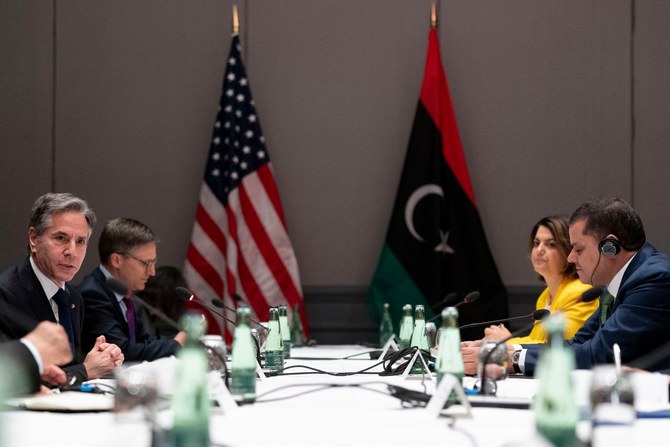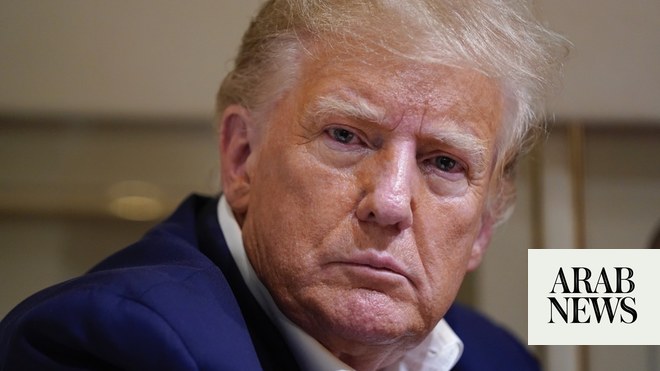
In Libya’s fractured political and security landscape, the evolution of hybrid armed groups into near quasi-state actors has become a significant challenge obstructing the nation’s progress toward stability, security and sovereignty.
A convoluted dynamic is now the norm, whereby nonstate actors are firmly welded to what remains of Libya’s still functioning institutions, creating new political economies that thrive on a predatory governance model that is detrimental to the fabric of Libyan society. This strange mesh of political leadership, financial systems, transnational organized crime and heavily armed groups with foreign backing now ties any prospects of a promising Libyan future to the almost impossible task of dismantling these groups and the political economies that sustain them.
Hybrid groups in Libya have morphed into complex entities with vertically integrated operations that span from imposing tolls on urban streets to divvying up national resources — embedding themselves deeper within the country’s sociopolitical fabric. The political process in Libya, marred by division and inertia, often appears as a facade, with the real power dynamics being dictated by bargains between these groups and political elites. Such arrangements not only disenfranchise the Libyan populace but also cement the authority of these actors, making the transition toward a functioning state increasingly unreachable.
The timid return of the US to Libya with a new ambassador, after many years of failures, can be a positive step to at least a limited extent, given the major mistakes Washington has made in Libya over the past few years, such as engaging with and giving legitimacy to some of the worst characters that emerged after the fall of Muammar Qaddafi.
The timid return of the US to Libya with a new ambassador, after many years of failures, can be a positive step
Hafed Al-Ghwell
The pending withdrawal of more than 1,000 US personnel from Niger, reports of a series of shipments of advanced Russian hardware to Tobruk and even the establishment of Russian military bases in the Eastern part of Libya might have caused some panic and a few sleepless nights across the Atlantic. By returning to Libya, the US will be able to put diplomatic boots on the ground, so to speak, which may help it make some serious headway in countering the existing and emerging threats, if only to safeguard American strategic interests in the Southern Mediterranean.
So, how can Washington succeed in, for instance, countering Russia’s deepening influence in eastern Libya and the likelihood of Western “over the horizon” counterterrorism operations going “blind” in parts of the Sahel? The US must take an active role in steering political and diplomatic activity toward rebuilding the collapsed Libyan state, rather than its repeated policy failures of trying to arrange a compromise between the thuggish forces that created this ever-expanding mafia state.
As such, a reengaged US policy toward Libya must also prioritize the dismantling of Libya’s corrosive political economies, which are central to the power and influence of its armed nonstate groups. This endeavor is indispensable for slowing Libya’s fragmentation and energizing efforts toward unified governance.
Until then, however, Libya’s political impasse will persist, driven by a mafia-like ruling elite that prioritizes power and money over the populace and a financial system that is disproportionately reliant on oil revenues, which creates an endless cycle of opaque wealth distribution favoring the elites. The morass of semiofficial, mostly state-funded, hybrid groups — benefiting from state privileges while exerting mafia-like territorial control — remains the greatest barrier to any meaningful progress, state rebuilding and security sector reform.
For more than a decade, these groups have enjoyed unchecked expansion. Not only have their numbers grown exponentially, but US diplomats and military officials have also injected them with credibility through public meetings and photo opportunities showing America’s officials smiling while standing next to the worst of Libya’s thuggish spoilers and mafia leaders.
Washington’s strategy must therefore prioritize the dismantling of these economies through a multifaceted approach that includes encouraging transparent, equitable financial systems to cut off the flow of oil revenues to armed groups. There must also be robust support for nontraditional interventions that can quickly offer viable alternatives to discredited militia membership and foster inclusive political dialogue.
The inclusion of the Libyan populace in the political process — even through holding referendums in the absence of an ability to hold elections — is not merely a democratic ideal but a strategic necessity for degrading the influence of hybrid actors. The widespread mistrust in state institutions and political developments is a direct consequence of a system that allows criminal political elites to escape punishment and that simply benefits these exclusionary elites, leaving the broader population marginalized. Encouraging genuine decentralization and local governance would empower communities and create a bulwark against the resurgence of militia-based power.
A reengaged US policy toward Libya must prioritize the dismantling of Libya’s corrosive political economies
Hafed Al-Ghwell
Recognizing the pivotal role of security sector reform in paving the way for effective governance in Libya, there has been an intensive discourse among policymakers and analysts over the prospects for the successful implementation of reforms specific to the Libyan context. Yet, despite extensive deliberation, strategic missteps have plagued attempts at reform, such as an overreliance on so-called train and equip programs, which have failed to address the need for sustainable and holistic strategies. Such initiatives, undercut by a shortsightedness that prioritizes quick fixes over the foundational restructuring of Libya’s security apparatus, remain insufficient for long-term stability.
Furthermore, within Libya, officials have engaged in superficial restructurings of security-related ministries, driven by internal power dynamics rather than a comprehensive vision — all a byproduct of those malignant militia-state dynamics. Those decisions only deliver the facade of reform, yet systematically undermine genuine progress while purporting to contribute to security sector reform.
Libya’s security sector is still growing to this day — drawing recruits into a mix of state-affiliated and nonstate militias — meaning the need for interventions cannot be deferred until a nebulous “post-conflict” scenario crystallizes. Instead, the US and its Western partners must draw inspiration from the Democratic Republic of the Congo’s more proactive and comprehensive “next-generation disarmament, demobilization and reintegration,” which is well suited to the Libya scenario.
This model, unlike its predecessors, does not await peace agreements and instead initiates action in anticipation of them. Its scope extends beyond piecemeal efforts, integrating activities that align with broader national development aims. Crucially, it functions in tandem with security sector reform, transitional justice and state-rebuilding initiatives. This approach recognizes the dismantling of Libya’s hybrid groups not as a static program but as a fluid political process, one which is acutely attuned to localized contexts.
It is through these initiatives, continuously adapted to the Libyan sociopolitical dynamics, that the US can reengage in a meaningful and credible way. A renewed focus on underpinning long-term solutions over short-term illusionary gains — and recognizing these efforts as inherently political and intertwined with the overarching objectives of national unity and development — would be groundbreaking. Strategic US participation, in concert with international partners, would also help de-incentivize and disassemble the hybrid groups entrenched within Libya’s political and economic sphere, thereby advancing the country toward the dissolution of political gridlocks and the restoration of its sovereignty.
Only by tackling these underlying issues can the US hope to contribute to a stable and unified Libya, where governance and economic opportunities are not held hostage by armed factions, some of them even headed by American citizens without any fear of legal consequences in Libya or the US.
Hafed Al-Ghwell is a senior fellow and executive director of the North Africa Initiative at the Foreign Policy Institute of the Johns Hopkins University School of Advanced International Studies in Washington, DC. X: @HafedAlGhwell












